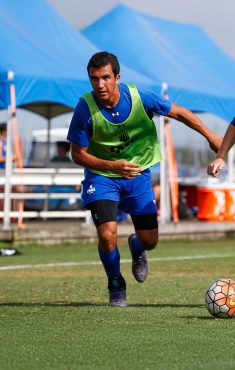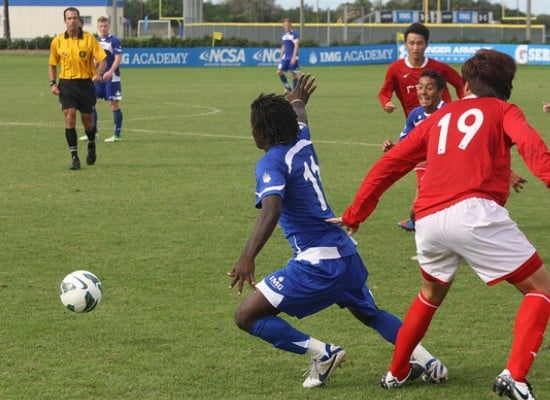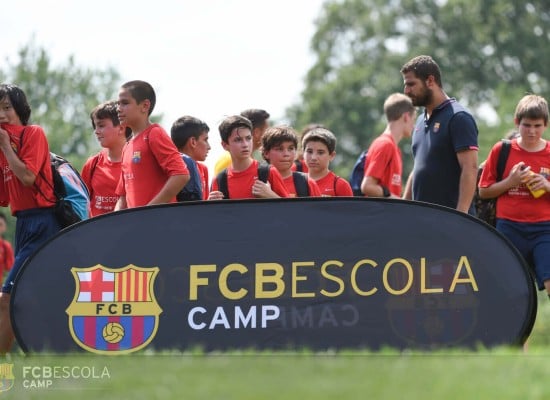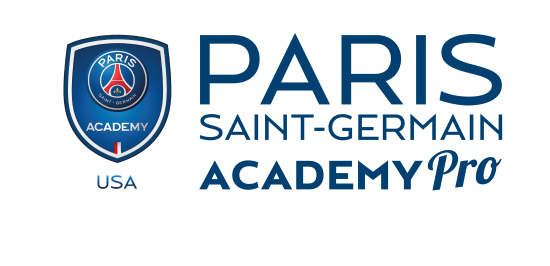Football Academies in USA 2026
The best soccer academies in the United States for youth in 2026!

Professional football training for promising youngsters
Studying and training at a soccer academy in the United States is a unique opportunity to combine your athletic development with a top-level academic education.
Discover how choosing the best soccer academy in the USA based on your profile can open the doors to both professional soccer and a college scholarship.
What are football academies in the United States?
High-performance academies in the United States offer comprehensive programs for young soccer players ages 10 to 18 who want to combine quality studies with elite training.
What do these academies offer?
- Professional Training: with USSF and UEFA-licensed coaches.
- Complete academic training: high school, American high school, or university preparation.
- Flexible duration: from short 3-month programs to annual cycles.
- University and professional development: scholarship opportunities and exposure to university coaches and scouts.
Index
What is the path to becoming a professional soccer player in the USA?
In the United States, the path to professional soccer typically goes through the educational system. From the age of 16 or 17, players strive to excel in academies, clubs, or school teams in order to earn a college scholarship. In college, they compete in leagues like the NCAA while continuing their training. The most outstanding players can be selected by professional teams through the MLS draft or sign with leagues like MLS Next Pro or the USL. Although there are alternative routes, the college route remains the most common path to professional soccer.
What opportunities do our academies in the USA offer?
We collaborate with the best soccer academies in the USA that not only compete in leagues like the NCAA but also have strong ties to European soccer. Therefore, if a player truly excels, they have a wide range of opportunities to continue their path to professional soccer.
Academy Options in the United States
Compare academies in different areas of the country, including Florida, Arizona, or Virginia.

Age and gender
Boys and girls from 10 to 18 years old
Location
Bradenton (Florida)
Academic options
Available from grade 6 to grade 12 as well as other postgraduate programs
Accommodation
Ascender Halls East, West, and South Residences

Age and gender
Boys and girls from 13 to 18 years old
Location
Arizona (EE.UU)
Academic options
Secondary education. Sports-oriented vocational training. University studies.
Accommodation
Casa Grande

Age and gender
Boys and girls from 13 to 17 years old
Location
Virginia
Academic options
Secondary education. Sports-oriented vocational training. University studies.
Accommodation
OAK HILL Academy
Ask Ertheo
Clients who contact Ertheo before booking a camp or program are much more satisfied with their overall experience

Selection Criteria and Player Profile
What does it take to get into an academy in the US?
Good technical and physical level.
In-person assessment or remote video assessment.
Basic-intermediate level of English (although not exclusive).
Good academic record (if choosing a program with a university option).
Participate in a high-performance summer soccer camp, where you can try out the USA academy of your choice while coaches assess your level before enrolling in a long-term program.
Most common profiles
Player aiming to get a college scholarship in the USA
Advanced soccer player looking to compete in an international environment and continue studying
Location of the Academies
Check out the interactive map with the locations of our high-performance academies in the United States:
Psg High-Performance Football Academy in the USA
City: Oak Hill
Country: USA
IMG Florida High-Performance Football Academy
City: Bradenton
Country: USA
FC Barcelona High Performance Football Academy in the USA
City: Casa Grande
Country: USA

Academic Offerings at Soccer Academies in the USA
American academies stand out for their dual focus: sports and education. These are the most common academic options:
- Middle School/High School (equivalent to ESO and Bachillerato)
- SAT preparation and university admissions
- English as a Second Language (ESL)
- University Pathway Programs (recognition of degrees in the USA)
Advantages of studying in the USA:
- Access to universities with athletic scholarships
- International certification
- Improvement of English in a real-life context
- Greater exposure to NCAA and NAIA coaches
Prices and Dates
The academies follow the American academic calendar:
Starts in August/September (long-term programs) or year-round (flexible/short-term programs).
Price comparison
| Services and prices | Paris Saint-Germain Academy USA Pro High Performance Soccer Academy | IMG Florida High Performance Soccer Academy | FC Barça USA High Performance Academy |
|---|---|---|---|
| 3-month program | No | No | No |
| 6-month program | 39.500 USD | Consult | No |
| 10-month program | 59.500 USD | From 70,500 USD | From €75,000 |
| School / University Education | YES | YES | YES |
| Language classes | YES | YES | Consult |
| Competitions | YES | YES | YES |
| Visa management | |||
| Mandatory insurance |
*The price of the 3, 6, or 10-month programs includes the soccer program, accommodation, and meals throughout the stay.
Ask Ertheo
Clients who contact Ertheo before booking a camp or program have a much more satisfying final experience.
F.A.Q.
What type of visa does my child need to study at a soccer academy in the U.S.?
To study at a soccer academy in the U.S. that combines academic studies with athletic training, international students typically require an F-1 visa. This visa allows students to study at accredited institutions (high schools or preparatory academies) and may include participation in non-professional sports activities. Academies will inform you about the entire visa process and provide you with the necessary documentation to obtain it.
Can my child qualify for an athletic or academic scholarship to study and compete at a U.S. university?
Yes, the academies we offer in the USA are a fantastic way to get a scholarship at the top-tier American universities in football.
Is academic education compatible with university?
Yes. Academies typically offer academic programs equivalent to American high school, allowing students to graduate with a diploma valid for admission to universities in the U.S. or other countries. Additionally, many academies design their programs to prepare students specifically for university entrance with a sports focus.
Where do the students live? What’s the living arrangement like?
International students typically live in on-campus residences. These residences are supervised by staff responsible for the well-being of the students. A multicultural environment is fostered, with clear living rules, structured schedules, and access to services such as food, medical care, and extracurricular activities.
What level of English does my child need?
An advanced level isn’t required to begin, but it’s recommended to have at least an intermediate level to adapt to the academic and social environment. Many schools offer English (ESL) classes as part of their program to support international students.
Can my son pursue his professional soccer career in the U.S.?
Yes, although it’s not guaranteed. Academies are designed to develop athletes at a competitive level, and many players use this route to gain access to universities with high-level programs, participate in major tournaments, and be noticed by scouts and coaches. The college system can be a springboard to professional leagues like MLS or European leagues, especially if they excel in the collegiate setting.
How long is a typical program at a soccer academy?
Programs typically last from one academic semester to several years, depending on the student’s age and goals. Some students complete the entire high school program in the U.S., while others attend for one or two years to improve their athletic and academic performance before applying to a university.
What’s the path to becoming a professional soccer player in the USA?
In the United States, the path to professional soccer typically begins in adolescence, through development programs at clubs, private academies, or school teams. Starting at age 16 or 17, many players seek opportunities to excel and be recruited by universities with strong athletic programs. The most common path to professional soccer is through the college system: players compete in leagues like the NCAA, NAIA, or NJCAA while pursuing their higher education. During these years, players develop their skills and gain exposure. The most outstanding players can be selected by professional teams through the Major League Soccer (MLS) draft or be signed directly by clubs in leagues like MLS Next Pro or the USL Championship. Although there are also options to sign as a professional before or outside of college, most soccer players in the U.S. turn professional after completing all or part of their college career. High-performance academies in the USA train you to reach your peak level during your pre-college years, allowing you to qualify for a good scholarship to study and compete at the top-tier soccer universities in the United States.
These academies also have contacts in Europe, so if a student excels, they can even secure professional contract opportunities with European professional or semi-professional teams.
Booking process for your High Performance Academy in the USA
Book your high-performance soccer program in just 3 steps
- Complete the registration form below.
- Our team of advisors will contact you to ensure you choose the option that best suits your profile and to answer any questions you may have.
- You begin the chosen admission process (take a trial or access remotely)
